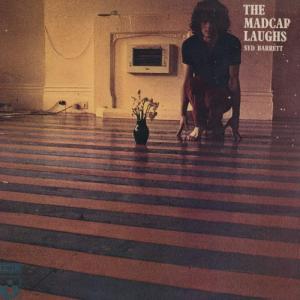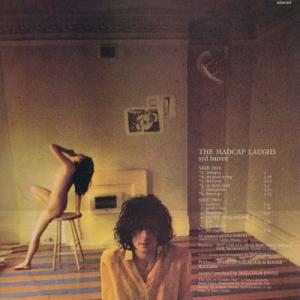Strawberry Bricks Entry:
Syd Barrett’s departure from Pink Floyd was unceremonious: The band
simply failed to pick him up before a gig in Southampton in January 1968.
Later that summer, manager Peter Jenner took Barrett to EMI Studios
for a few sessions; nothing came of them, and it would be a year until
Malcolm Jones, head of the newly formed Harvest label, took Barrett on
again—Jones’s 1982 memoir The Making of The Madcap Laughs is essential
reading. But by May, Barrett decamped with Pink Floyd to Ibiza, where
David Gilmour agreed to finish the album. Along with Roger Waters, they
spent the next few months between Pink Floyd commitments completing
The Madcap Laughs with Barrett. Mick Rock’s cover photo—Barrett
crouching in a bare room with striped floors—suggests a stripped-down
Barrett, and rightly so. Some of his former glory reveals itself in the “band”
tracks: Recorded with Soft Machine members, “No Good Trying” is ripe
with psychedelia, despite its sloppy timing, while “No Man’s Land,” with
Jerry Shirley (Humble Pie) on drums and Willie Wilson (Joker’s Wild)
on bass, is a lo-fi masterpiece. But the Gilmour-produced tracks, mainly
recorded with just guitar and vocals, are closer to a singer-songwriter style,
and convey his fragile post-Floyd mental state. Barrett flashes his lyrical
charm throughout, but the amateurish performance, deadpan vocals and
subpar guitar tone are unsettling to listen to; the start/stop of “If It’s in
You” and languor of “Terrapin” are prime examples of both. While the
straightforward “Here I Go” interjects a little levity, “Golden Hair” and
“Long Gone” present haunting, evocative moments of sheer genius, that
also borders on madness. As the album entered the UK Top 40, EMI then
opted for a second album. Barrett was still difficult to record, but Gilmour
(now with Rick Wright) again helped him complete the record. Ultimately,
Barrett, released in November, offered more of the same. In 1972, Barrett
teamed with Twink (ex-Pink Fairies) and Jack Monck (ex-Delivery) for the
short-lived Stars and a disastrous gig at the Corn Exchange in Cambridge
in February proved to be his last. By the late 70s, he reverted to his given
name, Roger, and lived out his days in his hometown of Cambridge.



